2 hands and 24 hours just don’t cut it anymore. The days of managing everything manually are over. If you are here to learn what automation systems you can put in place to cover all your ecommerce operations, you are in the right place.
This post explores how, when, and where to implement ecommerce automation, so you can focus on growth instead of getting caught up in operational tasks.
Let’s get right to it.
What is Ecommerce Automation?
Ecommerce automation involves using technology to handle repetitive tasks and online selling processes. It uses tools and software to manage tasks like order processing, inventory tracking, customer support, and marketing campaigns without needing manual intervention.
This helps you save time, reduce errors, operate more efficiently, reduce carbon footprint, and focus on important tasks like increasing sales and improving customer satisfaction.
Why Ecommerce Automation Matters
Ecommerce automation reduces the time you spend on manual tasks like order processing, inventory updates, and customer inquiries:
- It minimizes human error in data entry and order fulfillment, which improves your customer’s experience with your brand;
- It allows you to handle increased order volumes and scale operations efficiently without increasing administrative or operational costs;
- When you automate routine processes, you can meet customer demands faster and improve your operational productivity;
- Automation tools often provide valuable analytics and reporting capabilities so you can learn about customer behavior, inventory trends, and sales performance.
Why is it Important for Your Ecommerce Business
Ecommerce automation allows your business to be more flexible and responsive. When you automate everyday tasks, you can focus more on growing your business—like expanding your products or improving how you market them.
It also helps you react quickly to changes in the market. With automated tools that analyze data and give reports in real time, you can understand what your customers want and what’s happening in the market so that you can make smart decisions.
Plus, automation ensures your customer service stays consistent and your business runs smoothly. This builds trust with your customers and keeps them coming back.
Ecommerce Automation Benefits
As you go through each benefit, consider how it matches with your growth goals so you can better assess if this is a strategy you should be investing in now.
1. Improved personalization: Automation allows you to personalize customer interactions when you analyze purchase histories and preferences. This lets you create targeted marketing campaigns and improves customer satisfaction with tailored experiences.
2. Better inventory management: Automated inventory systems help prevent stockouts and overstocking because of real-time updates and forecasts based on sales trends and seasonal demands to reduce storage costs.
3. Faster decision-making: With automated analytics and reporting, you can quickly access sales performance, customer behavior, and other important metrics. This data-driven approach speeds up decision-making processes, allowing you to capitalize on opportunities and mitigate risks promptly.
4. Improved cross-channel integration: Automation makes it easy to connect your products across your website, social media, and other online stores. This helps customers see your brand and message the same way everywhere they shop, making your business more visible and your brand more consistent.
5. Cost efficiency: Automating tasks that repeat and organizing how you use resources helps cut down on costs from doing things by hand and managing office work. Additionally, even for tasks that require human intervention, automation puts a standard in place they can follow.
Most Used Types of Ecommerce Automation
In the world of ecommerce, tons of automation tools are available to help streamline different parts of running an online business.
Let’s break down the most popular types of ecommerce automation and see how each one can make your life easier and boost your business.
Marketing Automation
This means using software to automate repetitive marketing tasks like pitch deck creation, email campaigns, social media scheduling, and customer segmentation. This ensures marketing efforts are executed consistently and effectively every day.
It helps you reach their target audience more efficiently, nurture leads, and analyze campaign performance to optimize marketing strategies.
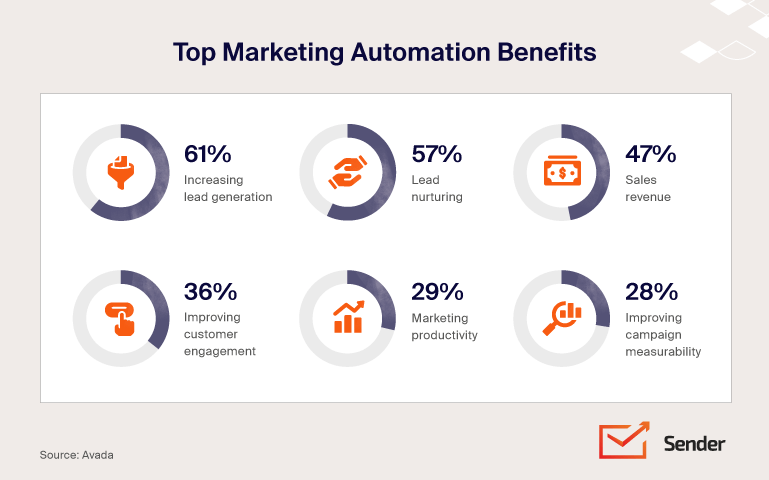
Inventory Management Automation
This involves using software to automatically track and update inventory levels, monitor stock movements, and generate alerts for restocking.
It ensures that businesses always have the right stock amount, stockouts, and overstocking issues.
Ecommerce Customer Service Automation
This uses software to manage customer inquiries, provide quick responses, and direct questions to the right departments automatically.
It ensures that customer issues are handled promptly and efficiently every day to improve customer satisfaction when it reduces response times and keeps consistent support so your team can focus on more complex customer ecommerce needs.
Customer Inquiries Automation
This involves using automation to handle customer inquiries, provide instant responses, and route queries to the appropriate departments. It ensures that customer issues are addressed promptly and efficiently every day.
It helps improve customer satisfaction by reducing wait times and ensuring consistent support so teams can focus on more complex customer needs.
Product Recommendations
This means using algorithms to suggest relevant products to customers based on their browsing history, purchase behavior, and preferences.
This improves their shopping experience by providing personalized suggestions using AI to convert them. With it, customers see items they are likely to be interested in, making them engage and convert better.
Email Automation
This is sending emails to customers based on predefined triggers or schedules (ex., new sign-ups or abandoned carts). This helps deliver timely and relevant messages to their audience without manual intervention every day.
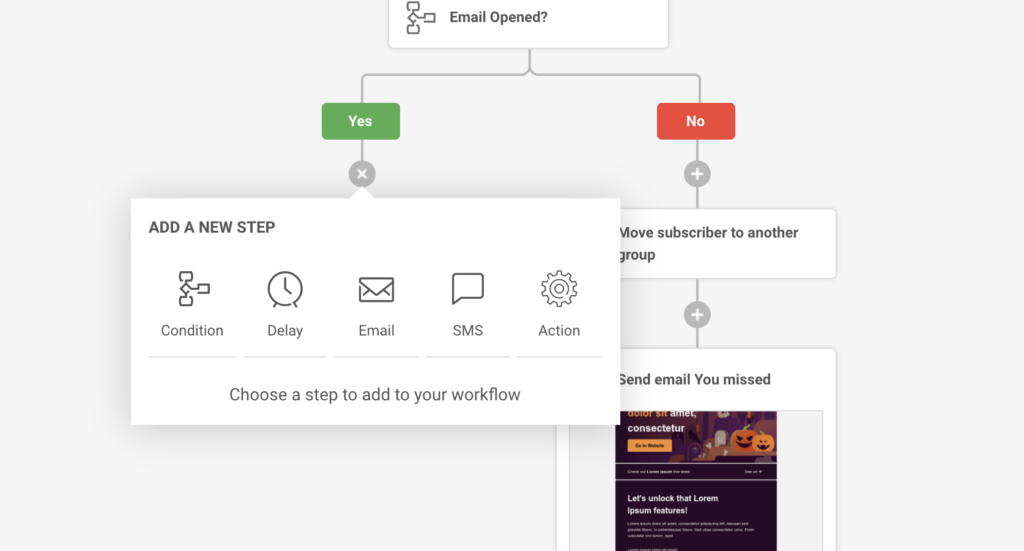
It nurtures customer relationships, promotes products or services, and drives conversions as it keeps consistent communication and engagement using personalized newsletters and email campaigns.
Create & send professional email campaigns with Sender’s drag-and-drop email builder. It’s fast, easy and effective.
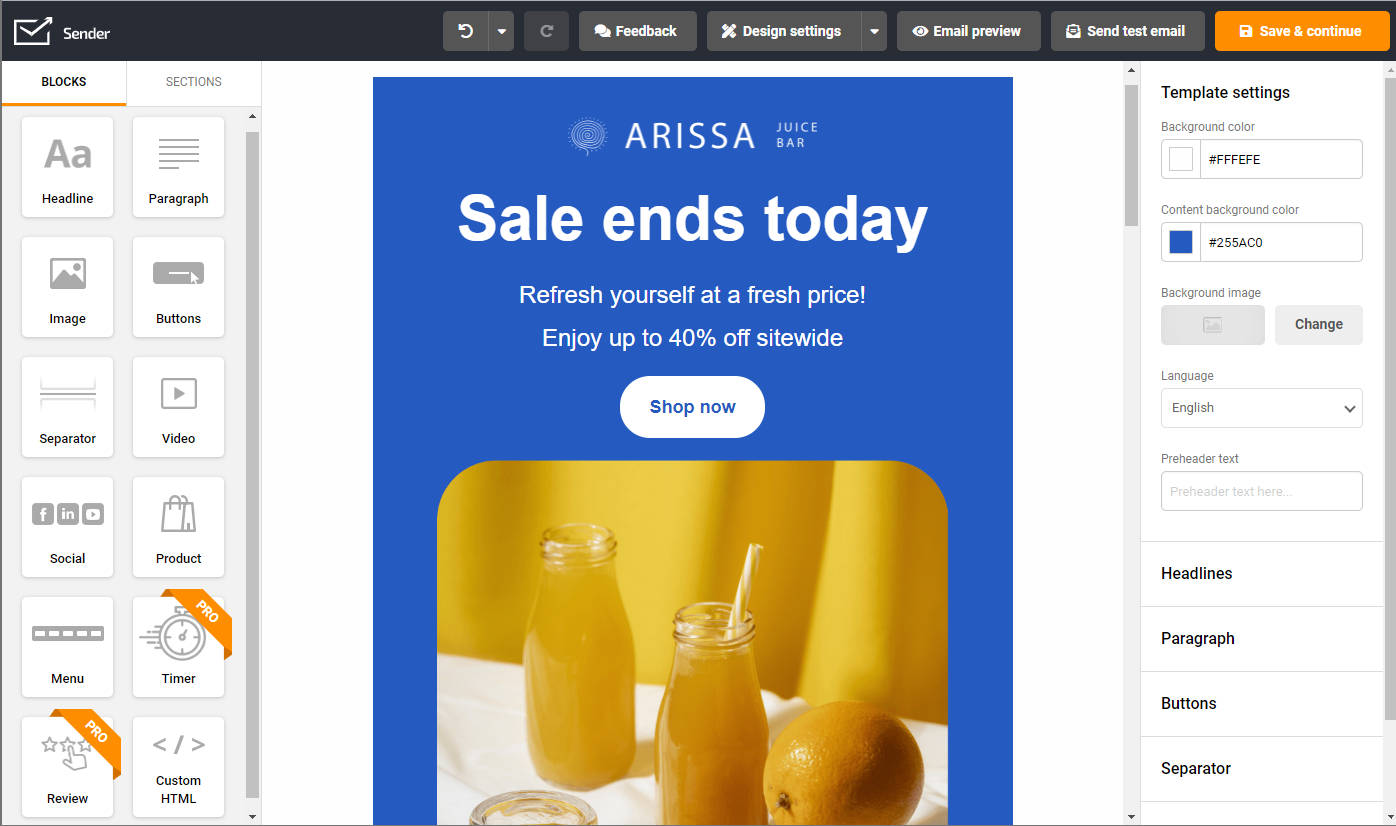
Customer Journey
This means using technology to track and optimize the path a customer takes from the initial contact to purchase, referrals, and repeat purchases.
This ensures businesses can personalize interactions at each stage of the customer journey to deliver targeted content and offers that resonate with their specific needs and preferences.
Gather Feedback & Review Automation
This uses tools to systematically collect customer feedback and manage online reviews. It helps improve customer satisfaction as it addresses concerns quickly to leverage positive feedback and build customer trust.
Repeat Purchases Automation
This involves using strategies to encourage customers to make additional purchases after their initial transaction.
It helps build loyal customers and repeat buyers as you offer personalized incentives, reminders, and recommendations based on each customer’s buying behavior. This type of automation makes it convenient for customers to return and purchase again.
Social Media Automation
This uses tools and software to schedule posts, monitor engagement, and manage multiple social media accounts efficiently.
With it, you can keep a consistent online presence and engage better with your audience daily. It automates posting updates and responding to comments so you can focus on creating compelling content and strategic interactions.
5 Best Ecommerce Automation Tools
With so many ecommerce automation tools out there, it can be overwhelming to figure out which ones are truly worth your time.
That’s why we’ve done the heavy lifting—researching, testing, and comparing—to bring you a list of the very best tools to help streamline your business.
1. Sender — Best Ecommerce Automation Software
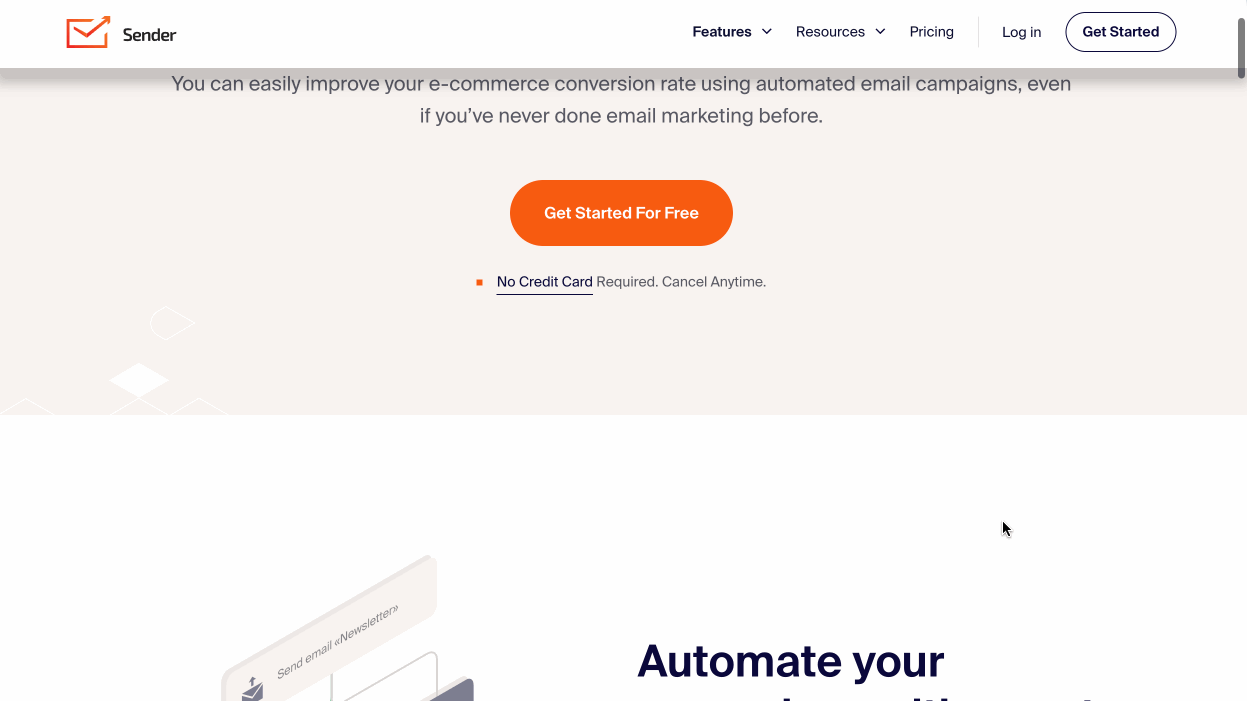
Sender is an email and SMS powerhouse where you can automate campaigns from when they first interact with your brand up to when you create campaigns for repeat purchases.
It can automate:
- Creating, scheduling, and sending personalized email campaigns;
- Segmenting your email list based on customer behavior and preferences;
- Sending automated order confirmations, shipping notifications, and follow-up emails;
- A/B tests to optimize email performance;
- Detailed insights into email campaign performance: open rates, click-through rates, and conversions.
Why use Sender:
- Sender automates the entire email marketing process, freeing up time for your team to focus on other important tasks;
- Personalized and timely emails improve customer engagement and drive higher conversion rates;
- With its targeted and automated email campaigns, you can generate more repeat purchases and higher sales;
- With 24/7 human support, your customers get the help they need when they need them;
- It comes with detailed analytics to help you understand what works and what doesn’t to refine your marketing strategies.
2. Shopify — One of the Best Ecommerce Platforms

Shopify is an all-in-one ecommerce platform where you can create, customize, and manage your online store with ease. It automates inventory management to customer interactions, to make sure your customers get a seamless shopping experience.
It can automate:
- Processing orders and updating inventory in real-time;
- Sending automated order confirmations, shipping updates, and delivery notifications;
- Running marketing campaigns, including email marketing, social media ads, and discount offers;
- Tracking inventory levels and providing low-stock alerts;
- Generating detailed sales reports and analytics to monitor business performance.
Why use Shopify:
- Shopify automates key tasks (order processing, inventory updates, and customer notifications) so you can focus on growing your business rather than managing day-to-day operations;
- Automated notifications keep customers informed and satisfied, which improves their overall shopping experience;
- Automating order processing and inventory tracking means reducing manual errors and saving time;
- Shopify’s scalable features can handle increased traffic and sales effortlessly;
- With comprehensive analytics, Shopify helps you make data-driven decisions to optimize your strategies.
3. Woocommerce — Best for Ecommerce Businesses
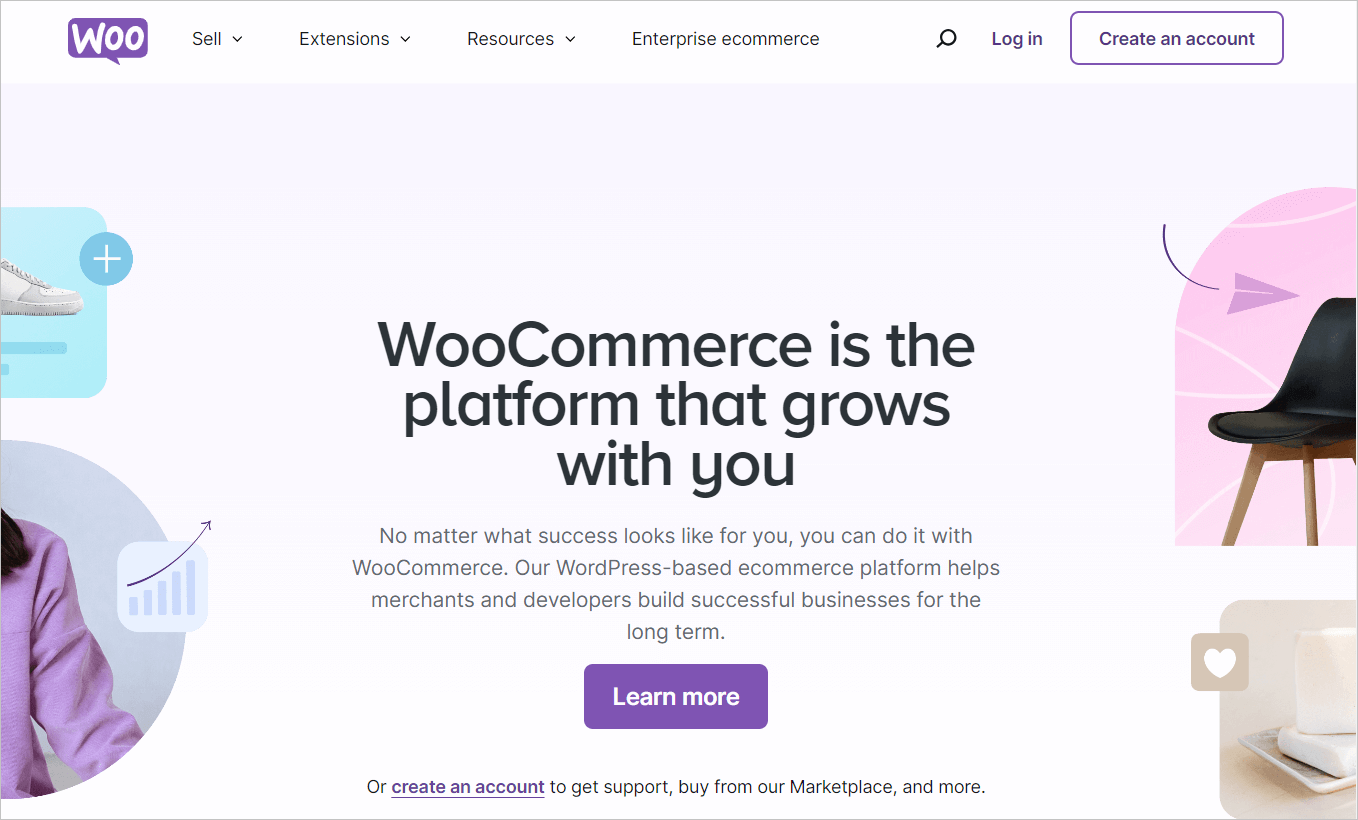
WooCommerce is a flexible ecommerce platform built on WordPress that comes with extensive customization options for your online store’s unique needs.
It can automate:
- Managing product listings and updating inventory levels;
- Processing orders and sending automated order confirmations;
- Generating and sending automated invoices and receipts;
- Running targeted email marketing campaigns and follow-ups;
- Tracking sales performance and providing detailed analytics.
Why use WooCommerce:
- It automates core tasks like product management, order processing, and customer; communications while letting you customize your store to match your brand’s unique identity;
- Easily integrates with WordPress and a wide range of plugins so you can add the features and functionalities you need as your business grows;
- It offers powerful automation tools without a high price tag, making it an affordable choice for businesses of all sizes.
4. Magento — Great Ecommerce Marketing Automation
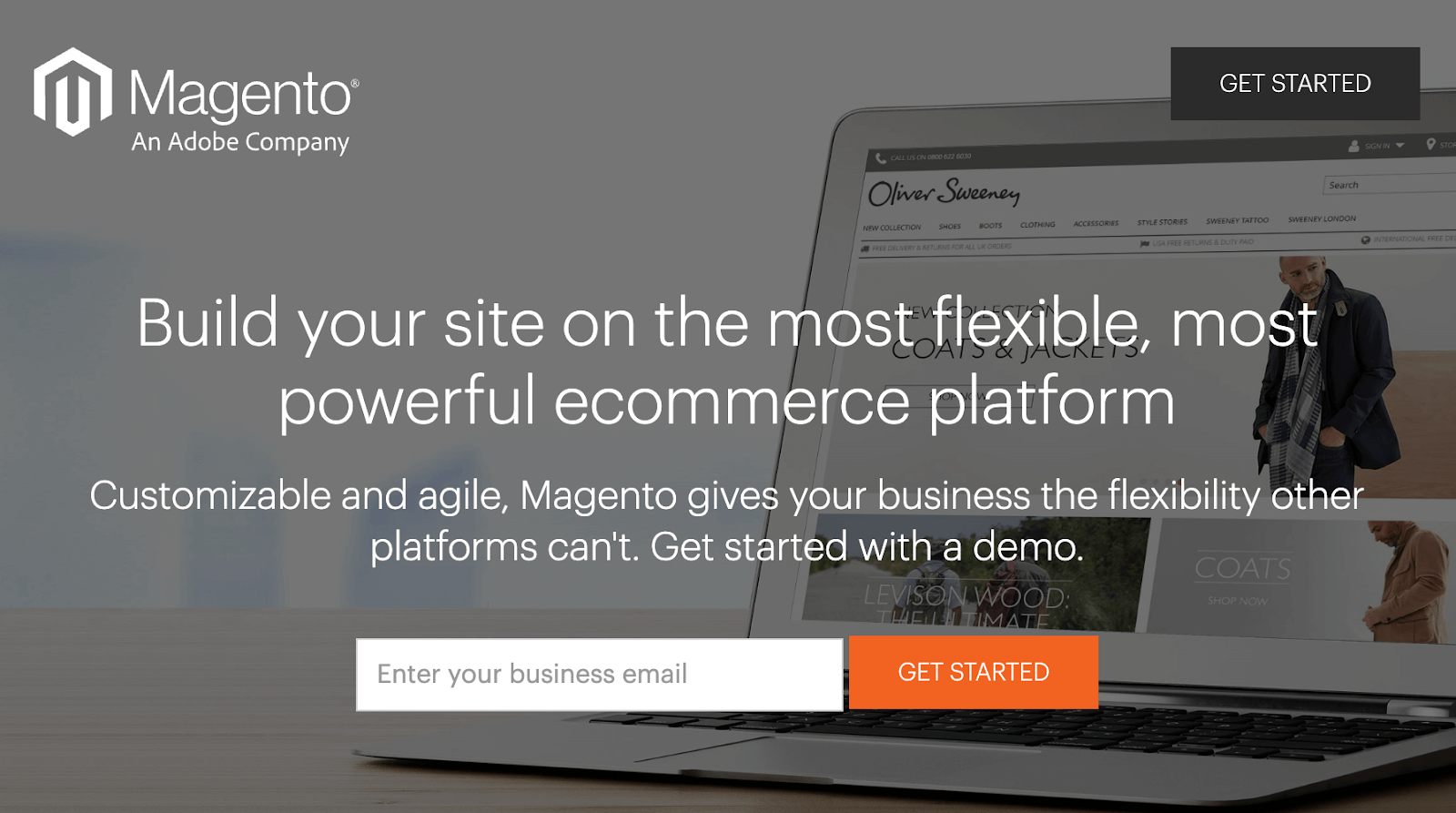
Magento is a robust ecommerce platform designed for enterprise-level businesses, offering powerful tools and extensive customization options. It automates critical aspects of ecommerce operations to support large-scale businesses and complex workflows.
It can automate:
- Managing large product catalogs and updating inventory;
- Processing high-volume orders and sending automated notifications;
- Personalizing customer experiences with targeted marketing campaigns;
- Handling multi-channel sales and integrating with various third-party systems;
- Providing comprehensive analytics and performance reports.
Why use Magento:
- Magento automates critical tasks while supporting large-scale operations and complex workflows;
- Offers powerful customization options to tailor every aspect of your online store to meet specific business needs;
- Designed to handle high traffic and sales volumes, which is ideal for growing businesses and enterprises;
- Personalizes customer interactions with targeted campaigns and seamless multi-channel integration.
5. BigCommerce — Superb Ecommerce Automation Software
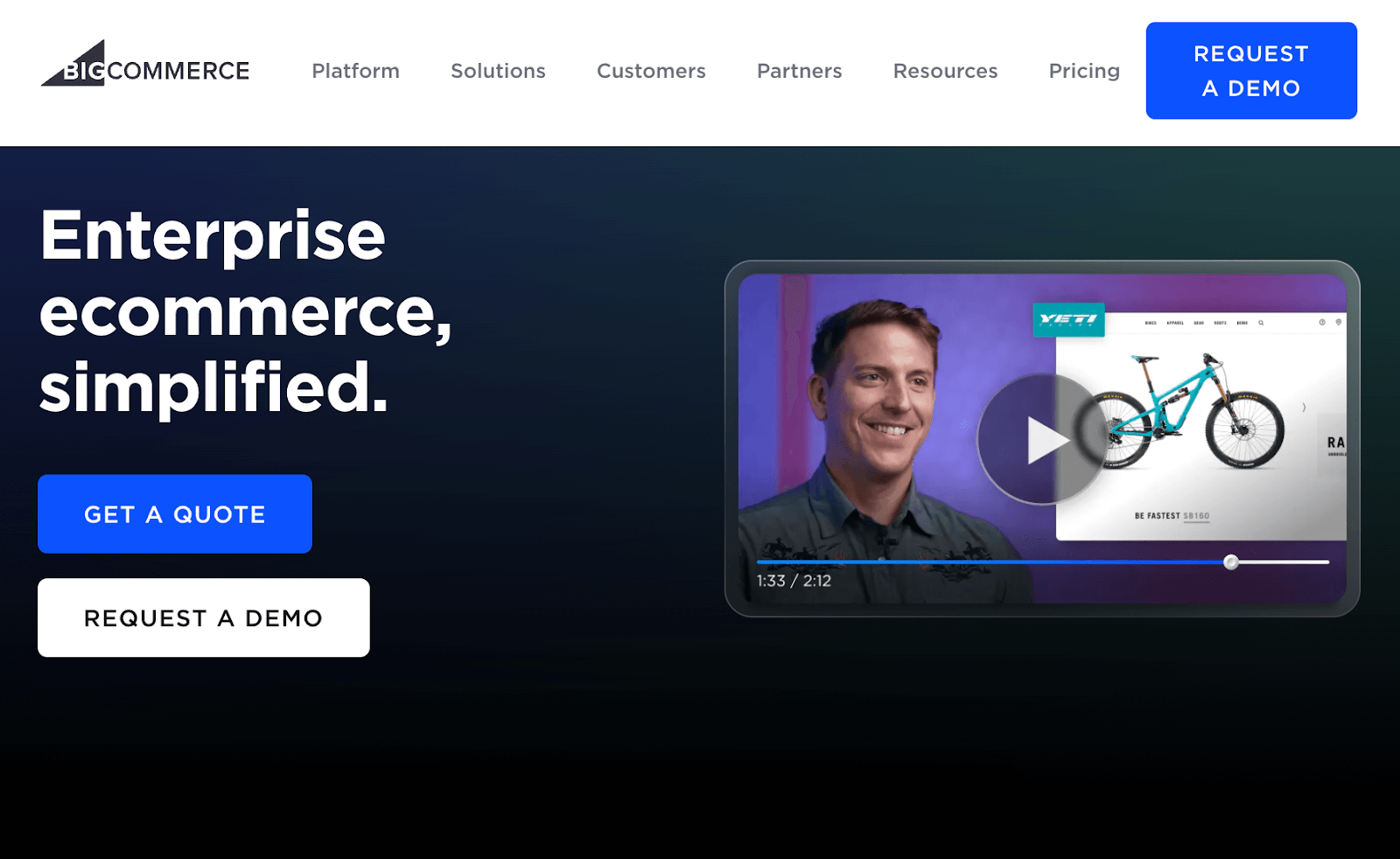
BigCommerce is tailored for businesses looking to expand their online presence. It offers advanced tools and features to streamline operations, including built-in SEO optimization, customizable storefronts, and several payment gateway integrations.
It also comes with a robust infrastructure that supports seamless integration with Amazon and eBay and provides a flexible API for custom solutions.
It can automate:
- Managing product listings and inventory updates;
- Processing orders and sending automated confirmations and notifications;
- Running marketing campaigns, including email and social media;
- Synchronizing sales across multiple channels and marketplaces;
- Generating detailed sales reports and analytics.
Why use BigCommerce:
- BigCommerce automates product listing management, inventory updates, and order processing so you can focus on scaling your business instead of handling day-to-day operations;
- Seamlessly integrates with different sales channels and marketplaces;
- Has an intuitive interface that makes it easy to manage and customize your store without needing extensive technical knowledge;
- Provides scalable solutions that can grow with your business.
Conclusion
As you explore ecommerce automation strategies for your business, consider this: Which repetitive tasks can you automate to free up valuable time right after this read?
Think about this question and prioritize one area to start implementing automation. Your proactive approach today can pave the way for a more efficient and scalable ecommerce operation tomorrow.
Find more insights on the best marketing tools of the year in this article: 23 Best Marketing Automation Tools & Platforms in 2024





